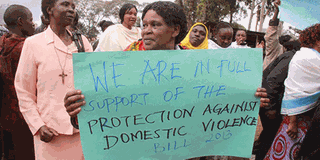Police, NGEC team up to revive gender desks

Members of the public in a procession moment after the launch of a Gender Based Violence reporting desk at Nyeri Central Police station in 2014. The desks make it easier for people to report gender-based crimes. PHOTO | POOL | NATION MEDIA GROUP
The National Gender and Equality Commission (NGEC) is finalising on a program to revive docile gender desks in police stations countrywide.
NGEC chairperson Dr Joyce Mutinda has revealed that the commission is working with the Ministry of Interior and the National Police Service (NPS) to fast track the project.
During a telephone interview, Dr Mutinda told the Nation that the commission is determined to ensure there are functioning gender desks in police stations adding that plans are at an advanced stage.
She also revealed that there are partners working with the commission to train police officers on how to deal with gender related issues reported at the stations.
Public relations
“The training will ensure that police officers are fully trained on what it entails to get statements and how to collect samples from GBV victims and survivors. This will ensure that cases touching on GBV are tight when taken to court to ensure justice for the victims,” she said.
She added the training will also focus on how to improve on public relations between the police officers and members of the public.
“We have had instances where the victims are intimidated or frustrated by police officers when they go to report abuse,” she said.
According to UN-Women, gender desks are specialised focal points that deal with gender issues (or specifically on violence against women) in the police stations in a country.
The mandate of the gender desks includes investigating cases of GBV and to charge the perpetrators accordingly; improve the response to violence survivors which may include referrals to medical facilities and other institutions for professional services.
Apart from serving as a focal point for reporting sexual harassment, the desks are responsible for promoting procedures and protocols on investigations, interviewing, enforcing protection orders as well as increasing public awareness of GBV.
In January, Inspector General (IG) of Police Mr Hillary Mutyambai ordered police stations to reactivate gender desks to address rising cases of GBV.
In a speech read on his behalf by Senior Assistant Inspector of Police Miriam Muli in Mwala sub-county, Machakos during the launch of community policing, Mutyambai said the Ministry of Public Service, Gender and Youth Affairs will deploy trained officers who will handle GBV cases.
Provide privacy
The IG noted that cases of sodomy, defilement and child abuse are on the rise and victims lack the appropriate channels to address them.
"The gender desk will address gender issues, which need privacy that cannot be handled like any other cases reported in the police stations. A number of police officers were trained specifically on handling child abuse and other gender issues,” he said.
In February, the Director of Community Policing, Gender and Child Protection at the NPS Judy Lamet also revealed plans to have a 24-hour manned gender and children’s desks were at an advanced stage.
The move, she said, will provide privacy to some cases that cannot be directly reported at the reporting office like other normal cases.
Ms Lamet, who spoke to journalists on the side-lines of a seminar on community policing in Nakuru, said the department is currently collecting data in its police stations to identify how the program will be implemented.
“The directorate of gender and child protection is coming up with a plan to have all police stations manned with gender desks and children protection units with privacy sections, where victims and the public can report them,” she said.





